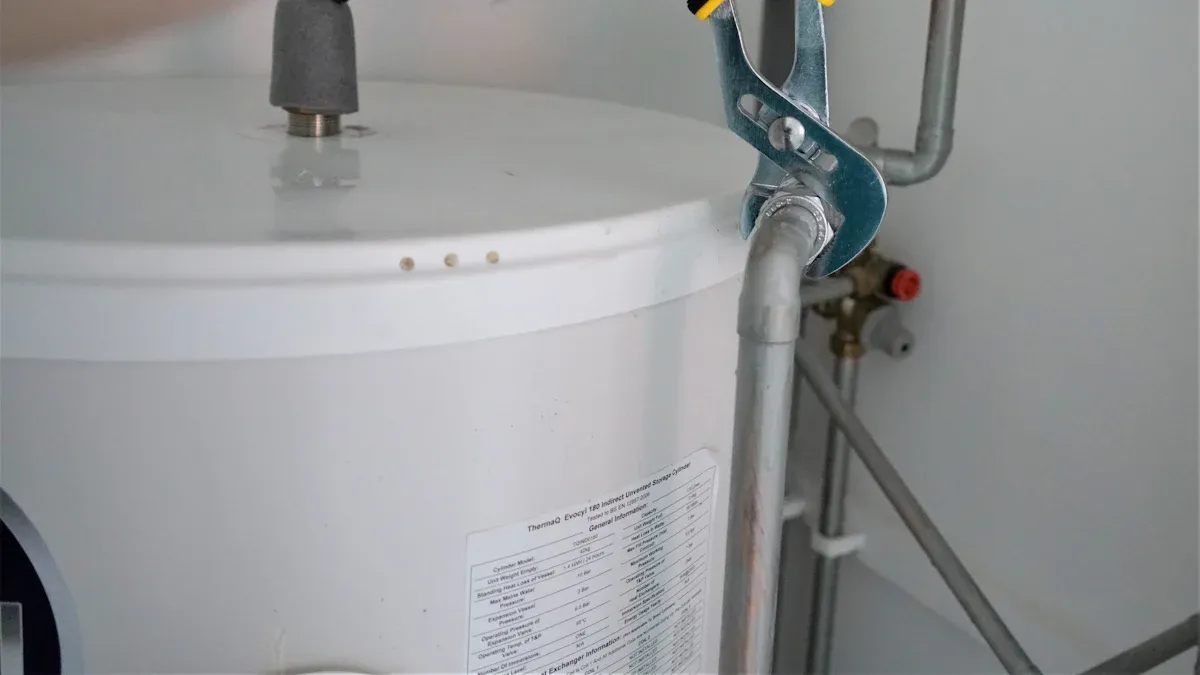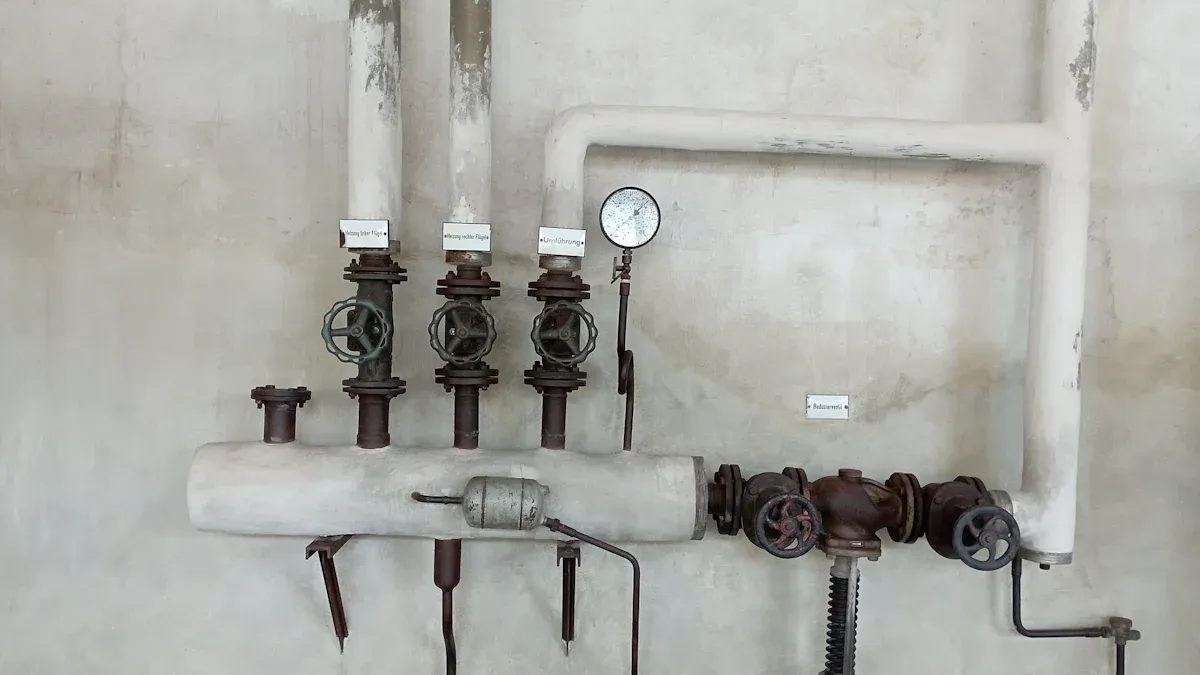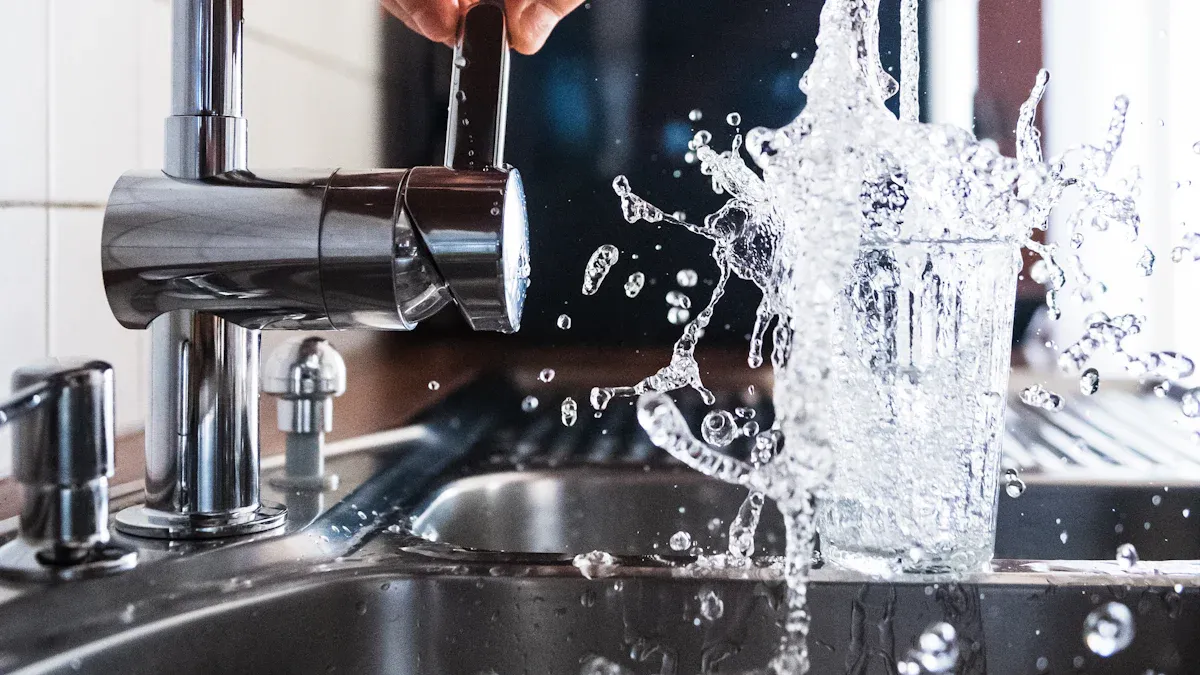
Lead in drinking water poses serious health risks, especially for children. UK public health data link lead exposure to neurodevelopmental deficits and behavioral disorders. Valve fittings made from lead-free materials help prevent contamination. Certified products ensure safe water delivery and protect vulnerable populations from harmful effects.
Key Takeaways
- Certified lead-free valve fittings, like those with WRAS approval, ensure safe drinking water by preventing lead contamination and meeting UK health standards.
- Choosing the right materials such as DZR brass, stainless steel, or certified plastics improves valve durability and protects water quality over time.
- Regular inspection and proper maintenance of valve fittings help prevent leaks and corrosion, extending system life and safeguarding public health.
Certification and Safety of Valve Fittings

WRAS Approval and UK Drinking Water Regulations
WRAS approval stands as a benchmark for safety and compliance in UK drinking water systems. The Water Regulations Advisory Scheme (WRAS) ensures that valve fittings meet strict requirements to protect public health. Materials must be non-toxic and safe for potable water, preventing contamination at every stage. Manufacturers design valves to resist corrosion and degradation, ensuring long-term reliability. Compliance with the UK Water Supply (Water Fittings) Regulations remains mandatory for all installations.
WRAS-approved valve fittings must meet several key criteria:
- Use of safe, non-toxic materials suitable for drinking water
- Mechanical suitability and resistance to corrosion
- Proper sizing to match pipework and flow requirements
- Pressure and temperature ratings that align with system needs
- Compatible connection types, such as BSP threaded or compression fittings
- Verified WRAS certification documentation before installation
Valve fittings that meet these standards help maintain water quality and system integrity. The design and materials must not react with water or leach harmful substances. WRAS certification provides assurance that the product will not compromise water safety or reliability.
Global Standards for Valve Fittings
Valve fittings used in drinking water systems must often comply with both national and international standards. Several globally recognized certifications ensure product safety and performance across different regions. These include:
- Kiwa Water Mark (Netherlands): Certification for products in contact with drinking water
- NSF (North America): Certification for plumbing and equipment contacting drinking water
- WRAS (Great Britain): Certification for compliance with UK water regulations
- DVGW-W270 (Germany): Certification including bacteriological growth testing
- ACS (France): Mandatory approval for materials in contact with drinking water
- WaterMark (Australia and New Zealand): Mandatory certification for plumbing and drainage products
| Standard Number | Description | Scope |
|---|---|---|
| ISO 1452-4:2009 | Plastics piping systems for water supply — PVC-U — Part 4: Valves | Covers unplasticized PVC valves used in water supply systems |
| ISO 1452-5:2009 | Plastics piping systems for water supply — PVC-U — Part 5: Fitness for purpose | Ensures system fitness for purpose including valves |
| ISO 2531:1998 & 2009 | Ductile iron pipes, fittings, accessories and joints for water applications | Specifies requirements for ductile iron valves and fittings |
| ISO 11177:2016 & 2019 | Vitreous and porcelain enamels — Enamelled valves and fittings for potable water | Quality requirements and testing for enamelled valves in water supply |
International certifications such as ISO, ASTM, ANSI/ASME, DIN, JIS, API, NSF, and DVGW cover a wide range of requirements. These standards address dimensions, materials, testing, performance, and safety. UK-specific certifications, including British Standards (BS) and the BSI Kitemark, focus on national regulations and quality assurance. The BSI Kitemark is recognized both in the UK and internationally, supporting European CE mark certification. UK standards often harmonize with European and ISO norms but retain unique requirements for certain fittings. WRAS approvals emphasize compliance with UK water supply regulations, ensuring products meet both international and national benchmarks.
What Certification Means for Health and Compliance
Certification of valve fittings plays a critical role in legal compliance and public health protection. WRAS certification ensures that valves do not contaminate potable water or cause waste, aligning with UK water supply regulations. Water suppliers rely on WRAS-approved products to avoid legal repercussions, such as fines or prosecution. Non-certified valves can lead to contamination, operational failures, and legal penalties.
| Aspect | Explanation |
|---|---|
| Legal Requirement | Water fittings must comply with Water Fittings Regulations to prevent contamination, waste, and misuse of water in England and Wales. |
| Role of Certification | WRAS certification provides assurance that valve fittings meet these legal standards and are suitable for installation. |
| Enforcement | UK water suppliers, such as United Utilities, have a legal duty to enforce these regulations by inspecting plumbing installations and issuing notices for non-compliance. |
| Consequences of Non-Compliance | Breaching regulations is a criminal offence that can lead to prosecution, enforcement actions including disconnection of water supply, and legal penalties. |
| Support for Compliance | Certification helps water suppliers verify fittings’ compliance, facilitating inspections and enforcement actions to protect public health. |
WRAS is an accreditation body made up of UK water suppliers. They promote compliance with the Water Supply (Water Fittings) Regulations. Using WRAS-approved valve fittings is the most reliable way to demonstrate compliance and avoid legal risks.
Certified valve fittings help water suppliers maintain system safety and efficiency. Certification supports inspections and enforcement, ensuring that only compliant products enter the market. This process protects public health and upholds the integrity of the UK’s drinking water supply.
Selecting Lead-Free, Zero-Leak Valve Fittings

Importance of Lead-Free Materials in Valve Fittings
Lead-free materials play a crucial role in safeguarding public health. UK regulations, including the Water Supply (Water Fittings) Regulations 1999, set strict standards for materials that come into contact with drinking water. Manufacturers design valve fittings using alloys such as dezincification-resistant (DZR) brass, which limits lead content to no more than 0.25% by weight on wetted surfaces. This approach aligns with both UK and European Union directives, ensuring that drinking water remains free from harmful contaminants. DZR brass offers durability and corrosion resistance, making it a preferred choice for potable water systems. Stainless steel and advanced plastics also provide lead-free alternatives, supporting compliance and long-term safety.
Tip: Always verify WRAS approval when selecting valve fittings. This certification confirms that the product meets UK health and safety standards for lead content and material quality.
Common Lead-Free Materials Used in UK Drinking Water Valve Fittings:
- Dezincification-resistant (DZR) brass
- Stainless steel (grades 304 and 316)
- Composite plastics (such as PVC, PTFE, and polyurethane)
Types of Valve Fittings for Drinking Water Systems
Valve fittings serve different functions within UK drinking water systems. Selection depends on the application, required flow control, and compatibility with system components. Hose fittings must match the hose diameter to prevent leaks and maintain optimal water flow. Material compatibility remains essential, as it affects both safety and durability.
| Valve Type | Description and Application |
|---|---|
| Ball Valves | Spherical disc controls flow; durable with excellent sealing; ideal for tight shut-off needs. |
| Check Valves | Prevent backflow; ensure one-directional flow; critical for contamination prevention; operate automatically. |
| Pressure Reducing Valves | Lower incoming water pressure to safe levels; protect plumbing from damage and leaks; maintain system efficiency. |
| Gate Valves | Used to completely stop water flow; suitable for maintenance or emergency shut-off; robust and secure sealing. |
| Butterfly Valves | Regulate flow with a rotating disc; lighter and cost-effective; used in large-diameter pipes; quick shut-off. |
| Solenoid Valves | Electrically controlled; used in automated systems for precise flow control; common in commercial/industrial use. |
Valve bodies may use lead-free brass, stainless steel, or composite plastics. Seals often feature NBR (Nitrile Buna Rubber) for neutral fluids or EPDM (Ethylene Propylene Diene Monomer) for higher heat resistance. Certified materials such as PVC and polyurethane are recommended for hoses and couplings, ensuring safety and durability.
Material Compatibility and Durability
Material compatibility directly influences the lifespan and reliability of valve fittings. Brass and stainless steel provide high mechanical strength, but improper selection can lead to corrosion issues. Dezincification-resistant brass resists corrosion and maintains strength, while stainless steel offers excellent resistance except in high-chloride environments, where pitting may occur. Plastics such as PTFE deliver outstanding chemical resistance and prevent degradation.
Valve fittings undergo rigorous testing under WRAS certification, including sensory evaluation, microbial growth tests, and metal extraction analysis. These tests simulate real-world conditions, ensuring that materials do not negatively affect water quality or system durability. OEM partners support manufacturers with technical expertise, helping maintain product quality throughout the lifecycle.
Note: Hybrid designs combining metals and plastics optimize both durability and performance. Always consider the specific water chemistry and environmental conditions when selecting materials.
Installation, Maintenance, and Preventing Corrosion
Proper installation and regular maintenance extend the lifespan of valve fittings and prevent corrosion. Routine inspections help detect early signs of wear, rust, or pitting. Visual checks for discoloration and leakage around seals ensure system integrity. Cleaning methods include mechanical brushing, safe chemical agents, and flushing with water or solvents.
Operators use protective covers to shield valves from adverse weather. Environmental controls such as humidity regulation and temperature insulation further reduce corrosion risk. Application of corrosion inhibitors—anodic, cathodic, mixed, or volatile—protects valves during storage and operation. Surface treatments like epoxy, PTFE, polyamide, and polyurethane coatings enhance corrosion resistance.
- Routine inspections for corrosion, wear, and leaks
- Cleaning and flushing to remove deposits
- Use of protective covers and environmental controls
- Application of corrosion inhibitors and surface coatings
Corrosion risk increases with low flow rates, which cause solids to settle and create crevices. Higher flow rates may lead to erosion and cavitation. Ceramic linings and polyurethane coatings improve resistance to these effects. Preventive maintenance and condition monitoring remain essential for prolonging valve and pump life in drinking water systems.
Certified, lead-free, zero-leak valve fittings protect public health, support water safety, and deliver long-term value.
| Benefit | Impact |
|---|---|
| Durability | Extensive testing ensures reliable performance and water savings. |
| Water Safety | Non-toxic, corrosion-resistant materials prevent contamination risks. |
| Customer Confidence | Certification builds trust in water suppliers and system integrity. |
FAQ
What does WRAS approval mean for valve fittings?
WRAS approval confirms that valve fittings meet UK water safety standards. They use non-toxic materials and undergo rigorous testing. Water suppliers trust WRAS-certified products for compliance.
Tip: Always check for WRAS certification before installation.
Which materials ensure lead-free valve fittings?
Manufacturers use DZR brass, stainless steel, and certified plastics. These materials resist corrosion and do not leach harmful substances. They support long-term water safety.
- DZR brass
- Stainless steel
- PVC and PTFE plastics
How often should operators inspect valve fittings?
Operators should inspect valve fittings every six months. Regular checks help detect leaks, corrosion, and wear. Early detection prevents contamination and extends system life.
| Inspection Frequency | Recommended Action |
|---|---|
| Every 6 months | Visual check for leaks |
| Annually | Clean and test operation |
Media Contact
Company Name: Ningbo Fenghua Metal Products Co., Ltd.
Email:Send Email
Phone: 0086-13968334411
Address:Huangtan Town, Ninghai County
City: Ningbo
State: Zhejiang
Country: China
Website: https://www.nbfh-metal.com/
